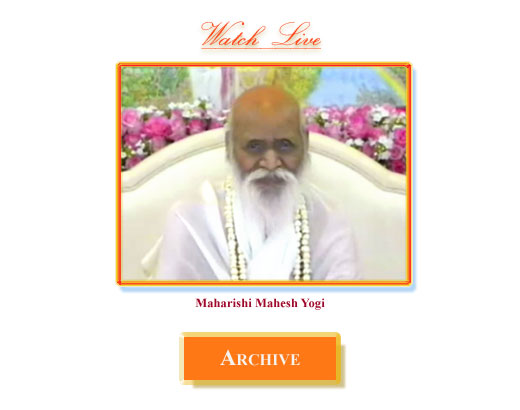


Maharishi's
Address
on the Seven States of Consciousness
28 November 2007
Highlights
In his address to the first World Congress of Rajas of the Global Country of World Peace, Maharishi Mahesh Yogi, Maharishi began by describing by the innumerable values of language, which when completely unified, do not show variations. He also explained the seven states of consciousness—waking, sleeping, dreaming, Transcendental Consciousness, and then Cosmic Consciousness, God Consciousness, and Brahman or Unity Consciousness—in terms of language.
Maharishi: ‘When we have a connectedness, there is no two to come from one to two. It’s already—one is there, two is there, infinite numbers of varieties are there. That is living unity. That is living Brahm. That is living free from mistakes. And when one is free from mistakes, joy is there, bliss is there—life is bliss. . . .
‘Each
consciousness has its own structure, has its own meaning, has its own
language, so to say.
‘Language of the Brahman state of consciousness is the language
of Totality. That is Veda. That is flow of Atma. That is Smriti [memory].
That is Shruti [that which is heard on the level of cognition in Transcendental
Consciousness]. These different languages of waking, dreaming, sleeping,
this, this, this, they cover the whole variety and each of the variety
is an aspect of Unity.
‘So when we want to give the knowledge of total reality,
then this is what we bring to the student, the basic seven states of consciousness.
Then we put them to experience seven states of consciousness. Three they
are already experiencing—sometime waking, dreaming, sleeping. That
they don't have to practise. The fourth [Transcendental Consciousness],
they have to let come without effort, just as waking to dreaming comes
without effort. It's a different thing, but one doesn't take an effort
for that. Just one relaxes, and it comes. And then, one relaxes, and comes
the deep sleep. So by relaxing, one comes to all these four states of
consciousness.
‘Relaxing more, one comes to five [Cosmic Consciousness];
relaxing more, one comes to six [God Consciousness]; relaxing more, completely
no effort—Brahman Consciousness [the seventh state of consciousness—Unity].
‘In Brahman Consciousness we find all the Devatas. They
are full of memory [of the Laws of Nature], and wherever there is memory,
there is movement. Wherever there is movement, there is sound. So from
memory, from Smriti, comes Shruti—comes the Veda.
‘This is the way of effortlessly experiencing from one
to the other, seven states of consciousness. And once they have come to
the seventh state of consciousness, the world of the seventh state of
consciousness is the total world. Seventh state of consciousness—from
there springs variety, on the basis of coming back to Smriti [memory of
the Self, Totality], and Shruti. “Shruti” means that which
is heard, which is the Veda, and that which is heard is a solid flowing.
That we understand to be a language.
‘And then we understand waking, dreaming, sleeping in terms
of language, language, language. And if we can gather our awareness together
in a unity state, that is the Brahman state, then in a most relaxed manner,
in the most natural way, we stand in a field of all possibilities. That
is why we practise. What we are practising? Relaxing, relaxing, relaxing.*
‘Where do different languages come? But they come and go
because we are practising relaxing. There is no intellectual thing that
one has to understand the language and understand what it means. There
is sound. What the sound is? Nothing. It is relaxing. And relaxing means
state of Unity. And unity of what? Innumerable, uncountable variety. So,
innumerable, uncountable variety become like the drops of water and all
the drops become ocean.
‘So our effort [is] to have most natural, most relaxed,
all encompassing, all unifying, all action put together—Brahman
Consciousness. This is our world, and we talk in terms of language. From
beginning to end, innumerable values of language. And if we say who speaks
this language? The Totality. A line, one line, and what makes a line?
A point. So a point is total Brahm. Either we call it a substance, call
it a language, call it a state of life, whatever, but that is Totality,
and that's how Yoga has become a subject of study.
‘When Yoga has become a subject of study, then what are
the ingredients which have to be put together? They become the subject
of study. So, variety becomes the subject of study. So the whole structure
of consciousness is totally presenting itself in the Brahman state of
consciousness, which is a field of all possibility. We want to have our
awareness in that field of all possibilities, all possibilities, Because
we want to do everything like that, like that
.
‘And then in that state we will do everything without doing
anything. We are in that state where our awareness is totally competent
on a level of all possibilities. That is how we are juggling around on
this sensory perception. Mental level, intellectual level, ego level,
cosmic level, and now we have the Totality open to us in terms of Atma,
in terms of Brahm, in terms of Veda. These are the words that are very
close to all possibilities.’
*Transcendental Meditation is practising
relaxing, relaxing, relaxing.
